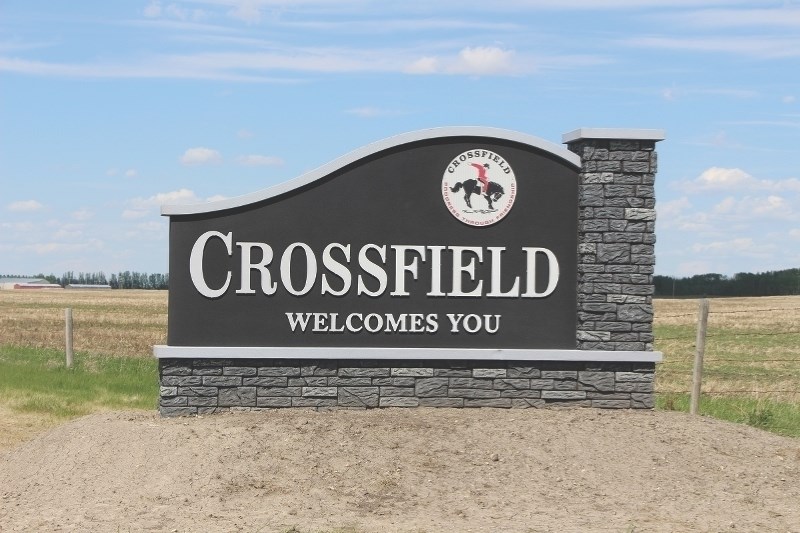A recent decision to ban the municipal sale of water for oil and gas fracking operations in the lower Red Deer River will not affect the Town of Crossfield's lucrative side business.
The Mountain View Regional Water Services Commission (MVRWSC) passed a motion at a recent special commission meeting, advising member communities, including Crossfield, that “water provided by the commission is to be used for domestic and municipal use. The commission immediately suspends any use of water for oil and gas field operations.”
Crossfield Mayor Kim Harris said the Town sells access to its wastewater as an alternative financial resource, but not fresh water.
“This change (at the Commission) does not have a direct effect on Crossfield’s business, as the restrictions are only related to the use of potable water for oil and gas field operations,” Harris said in an email to Rocky View Weekly on Jan. 18. “The Town continues to engage with oil and gas companies on the sale of our effluent for fracking purposes.”
The oilfield operation called fracking involves the injection of water down well bore holes to enhance production, an operation for which the provincial government does not want companies to use fresh water.
Harris went on to say that the motion by MVRWSC is intended to support the proactive management of water supply.
“This strategy helps the region to collectively and proactively manage the supply of a critical resource (in this case water) that we anticipate will be in low supply throughout 2024, due to low precipitation levels,” she wrote in an email.
“We will continue to sell our effluent to oil and gas companies and welcome the opportunity to optimize the use of our effluent in a meaningful way that supports the responsible use of our water resources, while also serving as a revenue source for the Town.”
As it relates to the drought conditions ahead in 2024, the Province of Alberta defined five stages for managing water shortage, with one being classified as water availability being a concern and stage five being an emergency under the Water Act. Harris said Alberta is currently in stage four and the situation is being closely monitored.
She added the Town of Crossfield will be advancing plans over the coming weeks to ensure Crossfield is prepared to respond if water availability decreases and to support the proactive management of water supply.
“The Town of Crossfield is committed to ensuring safe, reliable drinking water for our community and are active partners with the [MVRWSC] in ensuring we take responsible actions today that support us in this regard in the future,” she said.
The MVRWSC owns and operates the Anthony Henday Water Treatment Plant northwest of Innisfail. It provides potable water to member municipalities Innisfail, Bowden, Olds, Didsbury, Carstairs and Crossfield.
MVRWSC members say action is needed
The commission motion was moved by Didsbury town councillor Bill Windsor, the Town of Didsbury's representative on the commission. He discussed the matter further at a recent Didsbury council meeting.
“There are two reasons behind that (the commission motion),” said Windsor. “The first reason behind that is water licence out of the Red Deer River requires our water to be used for domestic purposes only, and so using it for oilfield purposes would jeopardize our licence.
“And the second reason is a philosophical thing, why are we using treated water for things like fracking and things like that, like oilfield operations?
“I would like to ratify that at the council level, that we too agree with that philosophical idea that the water that we purchase from the water commission, that is treated at the Anthony Henday (Water Treatment) Plant that it is not used for oilfield operations.”
Another council member felt this directive was unreasonable as the water is a commodity that municipalities should be able to use however they wish.
When MVRWSC chairman and Town of Carstairs mayor, Lance Colby, was asked if the commission is instructing municipalities not to sell water to oil and gas companies for use in fracking, he said, 'yes.'
“The request is that none of the (member) towns supply water for fracking,” Colby told Great West Media. “The big concern right now is with the possible water shortage (in the province). We want to make sure that all of the municipalities are ensuring that water is going for domestic and municipal purposes.”
Rebecca Shultz, minister of Environment and Protected Area, recently sent a letter to municipalities across the region. She said “municipal leaders throughout Alberta will need to take action” to ensure water is used wisely at a time when the province is facing drought conditions.
“We are asking all water users to start planning now to use less water in 2024,” said Shultz. “I know we can count on our municipal partners to work together in the face of adversity.”
-With files from Dan Singleton/ Great West Media



